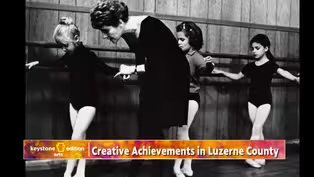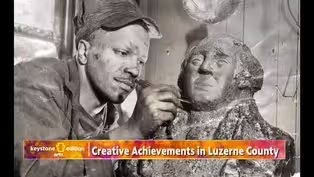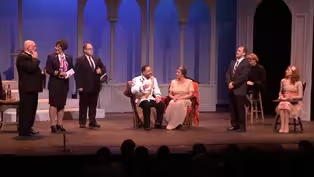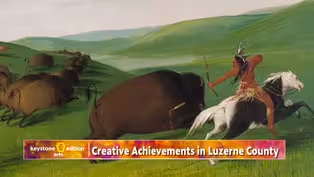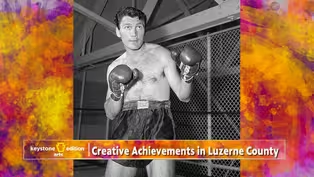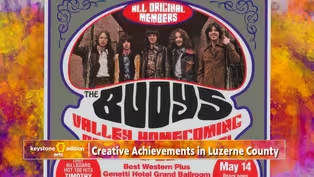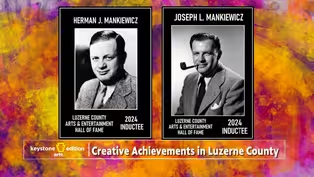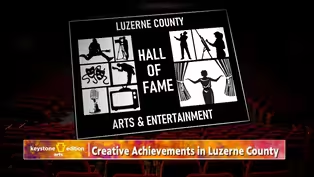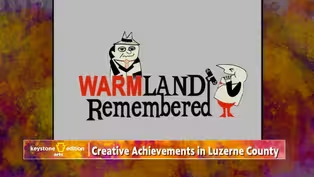Keystone Edition
Franz Kline
Clip: 11/25/2024 | 2m 55sVideo has Closed Captions
Dr. Darlene Miller-Lanning, director of the Hope Horn Gallery, speaks about Franz Kline.
Franz Kline, a Luzerne County Arts Hall of Fame inductee, gained international acclaim for his abstract art. Dr. Darlene Miller-Lanning highlights how Kline’s work, like mining, explored revelation and loss, reflecting the stark industrial landscapes of Northeastern Pennsylvania. His pieces, such as Lehigh, evoke balance, tension, and resilience, resonating deeply with the region’s history.
Problems playing video? | Closed Captioning Feedback
Problems playing video? | Closed Captioning Feedback
Keystone Edition is a local public television program presented by WVIA
Keystone Edition
Franz Kline
Clip: 11/25/2024 | 2m 55sVideo has Closed Captions
Franz Kline, a Luzerne County Arts Hall of Fame inductee, gained international acclaim for his abstract art. Dr. Darlene Miller-Lanning highlights how Kline’s work, like mining, explored revelation and loss, reflecting the stark industrial landscapes of Northeastern Pennsylvania. His pieces, such as Lehigh, evoke balance, tension, and resilience, resonating deeply with the region’s history.
Problems playing video? | Closed Captioning Feedback
How to Watch Keystone Edition
Keystone Edition is available to stream on pbs.org and the free PBS App, available on iPhone, Apple TV, Android TV, Android smartphones, Amazon Fire TV, Amazon Fire Tablet, Roku, Samsung Smart TV, and Vizio.
Providing Support for PBS.org
Learn Moreabout PBS online sponsorshipin 2023.
Another significant visual artist who came from coal, we might say, is Franz Kline, and the impact of his body of work is international.
Dr. Darlene Miller-Lanning speaks with us in the Hope Horn Gallery at the University of Scranton to help us put Kline into perspective.
(gentle touching music) - For a lot of the artists that I know, the significance of his work to us is that he understood that painting and mining are actually very similar things, and both of them represent an encounter with revelation and loss.
And so you work to uncover something, to excavate something, to claim something, and that can be a process that has consequences.
And so it's not that he would paint an image of a coal breaker or of a mine, but there was this idea of that kind of activity and then what kind of mark that leaves on a landscape or maybe on a community or on a psyche, right?
We got that.
(laughs) We understood it.
And I think Klein himself maybe was kind of reluctant to make a direct connection and would always say, "Oh, you know, my work is open to interpretation."
But we were from here.
There was a show at the Whitney in the 1990s, and when you walked through that exhibition, there were paintings that were 7, 10 feet in scale, I mean, some of them were huge.
And there was a huge one called "Lehigh," and I'm from Mountain Top, which is near the Lehigh River near White Haven, and the thing felt like home.
(laughs) It just, again, it wasn't descriptive, it wasn't something literal, but if you go through Northeastern Pennsylvania in the winter and you see that kind of stark landscape and you see the girders and the old industrial sites that are there, and there's just this kind of linear sense of things that have been moved and torn and built, and there's balance and tension and contrast, and all of that was there.
It was just inherent in that painting.
Postmodern stuff isn't always pretty.
It can be very edgy in a lot of ways, but that willingness to confront a difficult subject, again, is something that I think that Klein was willing to do.
And he himself had seen enough trouble to understand that and to know that you had to kind of look at it and pick it up and regroup, and not in necessarily a literal descriptive kind of way.
It was part of a bigger process of trying to understand how things came together and how they could be used as a foundation moving forward.
(gentle touching music)
Video has Closed Captions
Clip: 11/25/2024 | 2m 57s | Weisiberger, founder of the Pennsylvania Ballet, played a vital role in promoting ballet in America. (2m 57s)
Video has Closed Captions
Clip: 11/25/2024 | 2m 31s | His daughter highlights his innovative approach and deep connection to coal in the region (2m 31s)
Creative Achievements in Luzerne County - Preview
Preview: 11/25/2024 | 30s | Watch Monday, November 25th at 7pm on WVIA TV (30s)
Video has Closed Captions
Clip: 11/25/2024 | 1m 59s | Wilkes-Barre historian Tony Brooks reflects on the legacy of George Catlin (1m 59s)
Video has Closed Captions
Clip: 11/25/2024 | 43s | Jack Palance, born to a coal-mining family, transitioned from miner to boxer to acclaimed actor. (43s)
Max Furek / Luzerne County Music
Video has Closed Captions
Clip: 11/25/2024 | 4m 6s | Max Furek, journalist and author, discusses his passion for Northeastern Pennsylvania's music scene. (4m 6s)
Video has Closed Captions
Clip: 11/25/2024 | 1m 35s | Herman Mankiewicz’s childhood in Wilkes-Barre inspired the iconic "Rosebud" in Citizen Kane. (1m 35s)
Clip: 11/25/2024 | 1m 47s | The Fine Arts Fiesta celebrates diverse art forms, from exhibits to performances. (1m 47s)
Video has Closed Captions
Clip: 11/25/2024 | 3m 5s | Recollections of the vibrant atmosphere at WARM radio. (3m 5s)
Providing Support for PBS.org
Learn Moreabout PBS online sponsorship
- News and Public Affairs

Top journalists deliver compelling original analysis of the hour's headlines.

- News and Public Affairs

FRONTLINE is investigative journalism that questions, explains and changes our world.












Support for PBS provided by:
Keystone Edition is a local public television program presented by WVIA
